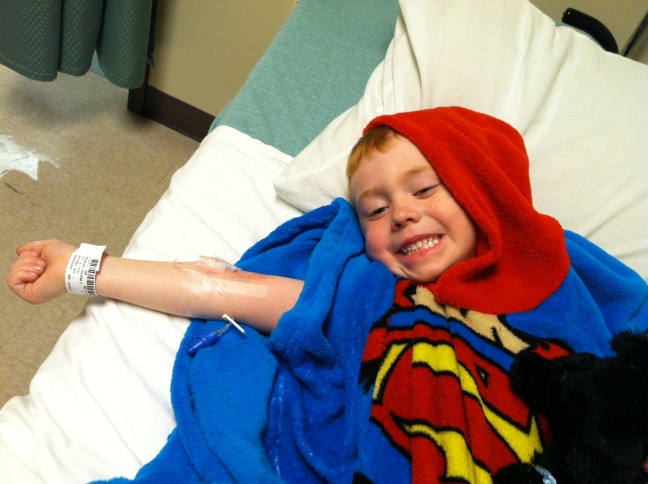of virilization of the external genitalia. Appearance of the genitalia in a male infant with CAH at birth is normal, although sometimes there can be a darkened color of the scrotum. Therefore, newborn screening has been most beneficial to male newborns with classic salt-wasting CAH as they can be detected and treated before they salt waste and become ill. The classic simple-virilizing form is manifested by no salt-wasting but females at birth are virilized as in the classic salt-wasting form. The mild non-classic (or late-onset) form is manifested by no genital abnormalities at birth in females or males; these children generally have no symptoms in infancy and early childhood but usually develop early pubic hair growth with modestly rapid growth in childhood and adolescence. Other manifestations of non-classic CAH include increased body hair, body odor, acne, menstrual problems, and/or infertility. As mentioned earlier, the clinical spectrum of CAH largely reflects the degree of severe to mild inherited structural problems (i.e. mutations) within the DNA dictating the amount of 21-hydroxylase enzyme deficiency in the adrenal steroid pathway.

Heredity
CAH is an inherited disorder which causes an enzyme deficiency (most commonly 21-hydroxylase) in the adrenal glands resulting in the inability of the adrenal glands to make hormones (cortisol and aldosterone), which are necessary to maintain life. The adrenal glands are located on top of the kidneys. Cortisol and aldosterone are produced from the adrenal glands by several steps of chemical changes by enzyme (protein substance) actions. Production of adrenal enzymes is controlled by genes (DNA). Genes are areas on the chromosomes with specific function. The chromosomal composition of an individual comes from the parents, each parent contributing one half and determines the genetic makeup of a child before birth. CAH results when two defective genes for adrenal enzyme production are inherited, with one defective gene being inherited from each parent. The gene (DNA) for 21-hydroxylase enzyme is located on chromosome number 6. The parents usually do not have CAH because they are only carriers. Since CAH is an autosomal recessive condition, affected individuals have to inherit two defective genes. Parents of an affected child have one normal gene and one abnormal gene. The normal gene is dominant and blocks the expression of the abnormal gene. When one carrier has a child with another carrier, there is a 25% chance that their child will inherit both the defective genes and have CAH. There is also a 25% chance that their child will inherit both normal genes and not have CAH and not be a carrier. There is a 50% chance that their child will inherit one normal and one defective gene and be a carrier of the genetic trait for CAH.
Classic 21-hydroxylase deficiency CAH occurs with a frequency of about 1 in 15,000 live births in North America but ranges from 1 in 8,000 to 1 in 29,000 live births depending on the ethnicity and racial background. CAH is most prevalent among Alaskan Yupiks. 21-hydroxylase deficiency accounts for at least 95% of all cases of CAH.
Other Enzyme Deficiencies
Other enzyme deficiencies (such as 11-ßhydroxylase, 3-ß hydroxysteroid dehydrogenase, 17-alpha hydroxylase, Star, and Cholesterol side chain cleavage enzyme) are rare causes of CAH and presentation may be similar to a degree but differs from 21-hydroxylase deficiency. Excess androgens produced during childhood cause rapid growth and skeletal advancement. This growth initially causes the child to be taller than most children their age; however, the end result of this growth and bone age advancement if untreated is a short stature as an adult.
The gene for the 21-hydroxylase enzyme can also be evaluated by DNA analysis which determines whether the gene is present or absent, or if the DNA make-up is changed (mutated) in the patient. By obtaining a blood sample, mutations can be identified in the affected individual. Genetic testing can also be done in other family members to see if they carry the mutations. Carrier detection serves the important function of alerting the person to the possibility of having a child affected with CAH. Genetic counseling can be done in those who are carriers for the CAH gene.
Newborn Screening for Congenital Adrenal Hyperplasia
Newborn screening for CAH has been mandated by law in the United States since 2008. It is performed by measuring the 17-hydroxyprogesterone level in a tiny blood spot obtained on a filter paper by heel prick of newborns usually at 24 to 48 hours of life (the time of the collection varies in each state). The screening test is performed by the laboratory of Department of Public Health in most state's regional programs. Check with your regional Department of Public Health on newborn screening for CAH for current status.
Prenatal Diagnosis
When there is a family member with CAH, it is possible to diagnosis a child before birth through tests performed during pregnancy. However, prenatal therapy is considered experimental as the risks and benefits of this procedure to the mother and to the affected child are unclear. Prenatal therapy should only be done at medical centers under approved research protocols.
Treatment of CAH in children, adolescents, and adults
The aim of treatment is to provide the body with the ability to maintain a normal energy level, balance of salt and water, normal growth, sexual maturation at an appropriate age, and fertility later in life. This is accomplished by replacing the inadequately produced cortisol hormone by a synthetic glucocorticoid. Hydrocortisone is the preferred glucocorticoid in growing children. Other glucocorticoids that are also commonly used are prednisone or prednisolone. Dexamethasone is a very long-acting glucocorticoid that is also sometimes used, but some physicians worry about the strong potency and long-term effects on linear growth. Steroid dosing needs to be individualized and doses vary between individuals with CAH. In salt wasters, a synthetic salt retaining hormone called fludrocortisone helps to retain sodium and water in the body. In infancy, salt replacement is also needed. The glucocorticoid medication is dosed based on body surface area and then adjusted based on hormone levels (e.g. 17-hydroxyprogesterone, androstenedione, testosterone) in the blood. The fludrocortisone medication is dosed based on blood tests (plasma renin activity level and electrolytes) as well as blood pressure measurements. Too much medication can lead to various problems, such as poor linear growth, short stature, weight gain, reduced bone density, and elevated blood pressure. Too little medication can also lead to problems, such as sodium and potassium imbalance, improper growth, advanced bone age, early pubic hair, acne, and fertility problems. Therefore, the care of children with CAH is complex. Treatment of CAH is ongoing, involving periodic medical evaluations, monitoring for medication dose adjustments, and checking compliance.
The virilized female genitalia may require corrective surgery as an infant, and if needed, again later in life. Talking to an experienced Pediatric Urologist about potential surgeries and the timing of the procedures is important.
Special care needs for CAH
Without cortisol, the body cannot respond to stress. A child affected with CAH can go into shock from infection, injury, or surgery. Extra doses of glucocorticoid are important at these times of stress. Therefore, during illness, the oral dose of synthetic glucocorticoid is tripled. However, if the child is not able to take the medication by mouth due to vomiting or cannot absorb the medication due to severe diarrhea, the parents should give the child an emergency injection of hydrocortisone into a muscle. They should then notify their child’s doctor and potentially take child to their local emergency department for evaluation.
 When the child is ill and receiving stress oral steroids, they should drink sugar containing liquids (and not just water) in order to avoid hypoglycemia. It is recommended to carry a special care instruction prepared by your child’s endocrinologist to the emergency department so that they are aware of the importance of your child receiving appropriate care with fluids and stress doses of hydrocortisone. CAH is a relatively rare condition and all doctors may not be aware of it.
When the child is ill and receiving stress oral steroids, they should drink sugar containing liquids (and not just water) in order to avoid hypoglycemia. It is recommended to carry a special care instruction prepared by your child’s endocrinologist to the emergency department so that they are aware of the importance of your child receiving appropriate care with fluids and stress doses of hydrocortisone. CAH is a relatively rare condition and all doctors may not be aware of it.
If at any point a child with CAH requires surgery, it is imperative that the child's endocrinologist be notified. For the stress of surgery, a child with CAH will require special doses of hydrocortisone during and after the surgery. The endocrinologist will be able to inform the other doctors of the necessary precautions. It is also mandatory to have your child wear a Medical Alert ID bracelet stating that your child has “adrenal insufficiency” or that they are “cortisol dependent”. In an emergency, this will alert health care personnel to the importance of your child receiving appropriate stress doses of glucocorticoids.
Treatment of CAH is life-long. Periodic medical check-ups, laboratory monitoring, and compliance with medications allows for a full and otherwise normal healthy life.
Recommended reading (free full text on-line):
Speiser PW, Azziz R, Baskin LS, Ghizzoni L, Hensle TW, et al. Congenital adrenal hyperplasia due to steroid 21-hydroxylase deficiency: an Endocrine Society Clinical Practice Guideline. J Clin Endocrinol Metab 2010; 95(9): 4133-4160.
Contributing Medical Specialist
Todd D. Nebesio, MD, FAAP
Associate Professor of Clinical Pediatrics
Indiana University School of Medicine
Riley Hospital for Children
Indianapolis, Indiana
Resources
» Download a printable version of the CAH brochure
» Download a printable version of Preventable Deaths: Panhypopituitarism & Adrenal Insufficiency brochure
» Click here for member benefits or to join The MAGIC Foundation
» "LIKE" The MAGIC Foundation's Facebook page
» Join our closed CAH Facebook group for parents. After you request to join, please message an admin to gain access or email Jenna at cah@magicfoundation.org
» Would you like to speak to someone about CAH? If so, call The MAGIC Foundation at 800-3MAGIC3 or (630) 836-8200 or Email Us